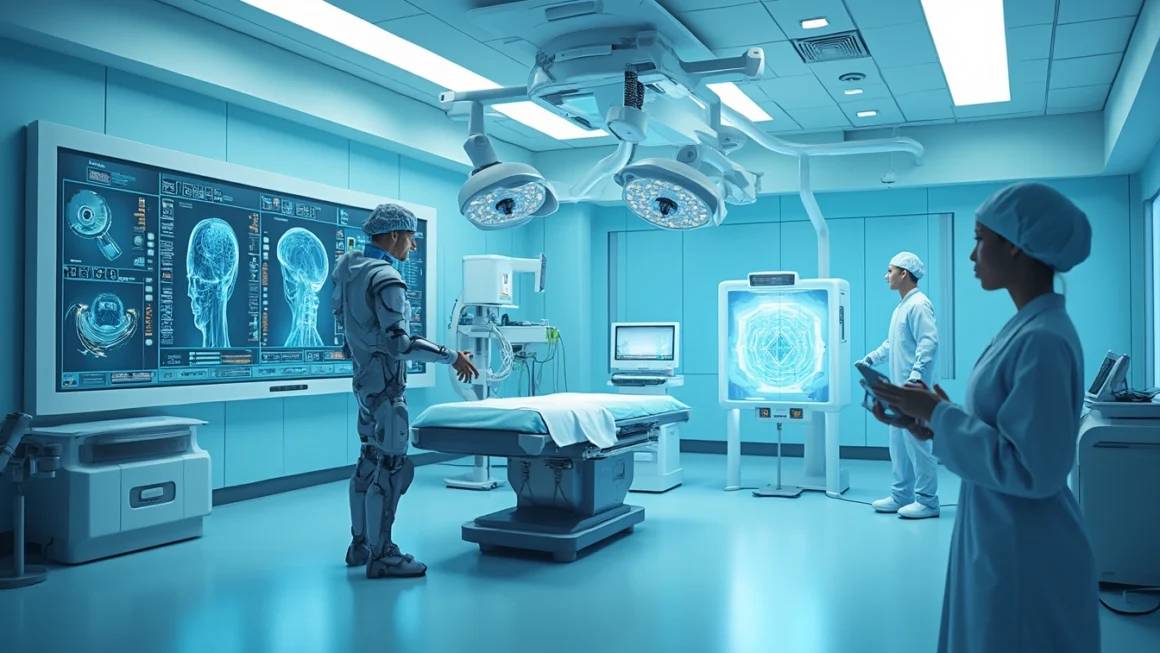The Rise of Artificial Intelligence in Healthcare
Table of Contents
Artificial Intelligence (AI) is revolutionizing the healthcare industry, offering unprecedented opportunities to improve patient care, streamline operations, and enhance medical research. As we delve into this transformative technology, it’s crucial to understand its impact and potential.
Enhancing Diagnosis and Treatment
One of the most significant applications of AI in healthcare is in diagnosis and treatment planning. Advanced algorithms can analyze medical images, such as X-rays and MRIs, with remarkable accuracy, often surpassing human capabilities. This technology not only speeds up the diagnostic process but also helps detect conditions that might be overlooked by the human eye.
Moreover, AI-powered systems can process vast amounts of medical data, including patient histories, genetic information, and the latest research findings, to suggest personalized treatment plans. This approach, known as precision medicine, tailors treatments to individual patients, potentially improving outcomes and reducing side effects.
Streamlining Administrative Tasks
Beyond clinical applications, AI is proving invaluable in handling administrative tasks in healthcare settings. From scheduling appointments to managing electronic health records, AI systems can significantly reduce the workload on healthcare professionals, allowing them to focus more on patient care.
Natural Language Processing (NLP), a branch of AI, is being used to transcribe and analyze doctor-patient conversations, automatically updating medical records and reducing paperwork. This not only saves time but also improves the accuracy of patient information.
Advancing Medical Research
AI is accelerating the pace of medical research by analyzing vast datasets and identifying patterns that might take humans years to discover. In drug discovery, for instance, AI algorithms can predict how different compounds will interact with target proteins, potentially speeding up the development of new medications.
Furthermore, AI is playing a crucial role in genomics research, helping scientists understand the complex relationships between genes and diseases. This could lead to breakthroughs in treating genetic disorders and developing more effective therapies.
Challenges and Ethical Considerations
While the potential of AI in healthcare is immense, it’s not without challenges. Data privacy and security are major concerns, as AI systems require access to sensitive patient information. Ensuring the protection of this data is paramount to maintaining public trust in AI-driven healthcare solutions.
There are also ethical considerations to address. For example, how do we ensure that AI systems don’t perpetuate existing biases in healthcare? And who is responsible if an AI-powered system makes a mistake in diagnosis or treatment recommendations?
The Future of AI in Healthcare
Despite these challenges, the future of AI in healthcare looks promising. As the technology continues to evolve, we can expect to see even more sophisticated applications. From AI-powered robots assisting in surgeries to virtual health assistants providing round-the-clock patient support, the possibilities are endless.
It’s important to note that AI is not meant to replace healthcare professionals but to augment their capabilities. By handling routine tasks and providing data-driven insights, AI can free up medical professionals to focus on the human aspects of care that machines cannot replicate.
Embracing the AI Revolution in Healthcare
As we stand on the brink of this AI revolution in healthcare, it’s crucial for healthcare providers, policymakers, and patients to work together to harness its potential while addressing the associated challenges. With careful implementation and ongoing evaluation, AI has the power to transform healthcare, making it more efficient, effective, and accessible for all.
To fully leverage the benefits of AI in healthcare, organizations need to integrate these technologies with their existing systems and workflows. Automation platforms can play a crucial role in this integration, enabling seamless data flow between AI systems and other healthcare applications.
In conclusion, the integration of AI in healthcare represents a paradigm shift in how we approach health and wellness. As we continue to explore and refine these technologies, we move closer to a future where healthcare is not just reactive but proactive, personalized, and more accessible than ever before.




